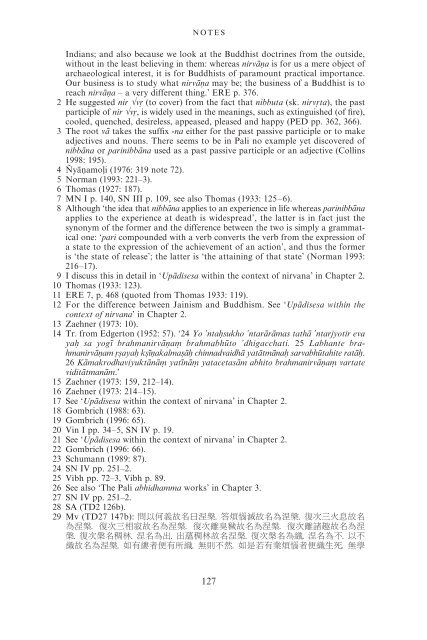Metaphor and Literalism in Buddhism: The ... - misterdanger.net
Metaphor and Literalism in Buddhism: The ... - misterdanger.net
Metaphor and Literalism in Buddhism: The ... - misterdanger.net
You also want an ePaper? Increase the reach of your titles
YUMPU automatically turns print PDFs into web optimized ePapers that Google loves.
NOTES<br />
Indians; <strong>and</strong> also because we look at the Buddhist doctr<strong>in</strong>es from the outside,<br />
without <strong>in</strong> the least believ<strong>in</strong>g <strong>in</strong> them: whereas nirvAOa is for us a mere object of<br />
archaeological <strong>in</strong>terest, it is for Buddhists of paramount practical importance.<br />
Our bus<strong>in</strong>ess is to study what nirvAOa may be; the bus<strong>in</strong>ess of a Buddhist is to<br />
reach nirvAOa – a very different th<strong>in</strong>g.’ ERE p. 376.<br />
2 He suggested nir √vK (to cover) from the fact that nibbuta (sk. nirvKta), the past<br />
participle of nir √vK, is widely used <strong>in</strong> the mean<strong>in</strong>gs, such as ext<strong>in</strong>guished (of fire),<br />
cooled, quenched, desireless, appeased, pleased <strong>and</strong> happy (PED pp. 362, 366).<br />
3 <strong>The</strong> root vA takes the suffix -na either for the past passive participle or to make<br />
adjectives <strong>and</strong> nouns. <strong>The</strong>re seems to be <strong>in</strong> Pali no example yet discovered of<br />
nibbAna or par<strong>in</strong>ibbAna used as a past passive participle or an adjective (Coll<strong>in</strong>s<br />
1998: 195).<br />
4Ñyaoamoti (1976: 319 note 72).<br />
5 Norman (1993: 221–3).<br />
6 Thomas (1927: 187).<br />
7 MN I p. 140, SN III p. 109, see also Thomas (1933: 125–6).<br />
8 Although ‘the idea that nibbAna applies to an experience <strong>in</strong> life whereas par<strong>in</strong>ibbAna<br />
applies to the experience at death is widespread’, the latter is <strong>in</strong> fact just the<br />
synonym of the former <strong>and</strong> the difference between the two is simply a grammatical<br />
one: ‘pari compounded with a verb converts the verb from the expression of<br />
a state to the expression of the achievement of an action’, <strong>and</strong> thus the former<br />
is ‘the state of release’; the latter is ‘the atta<strong>in</strong><strong>in</strong>g of that state’ (Norman 1993:<br />
216–17).<br />
9 I discuss this <strong>in</strong> detail <strong>in</strong> ‘UpAdisesa with<strong>in</strong> the context of nirvana’ <strong>in</strong> Chapter 2.<br />
10 Thomas (1933: 123).<br />
11 ERE 7, p. 468 (quoted from Thomas 1933: 119).<br />
12 For the difference between Ja<strong>in</strong>ism <strong>and</strong> <strong>Buddhism</strong>. See ‘UpAdisesa with<strong>in</strong> the<br />
context of nirvana’ <strong>in</strong> Chapter 2.<br />
13 Zaehner (1973: 10).<br />
14 Tr. from Edgerton (1952: 57). ‘24 Yo ’ntaPsukho ’ntarArAmas tathA ’ntarjyotir eva<br />
yaP sa yogC brahmanirvAOaN brahmabhEto ’dhigacchati. 25 Labhante brahmanirvAOam<br />
KLayaP kLCOakalmaLAP ch<strong>in</strong>nadvaidhA yatAtmAnaP sarvabhEtahite ratAP.<br />
26 KAmakrodhaviyuktAnAN yatCnAN yatacetasAm abhito brahmanirvAOaN vartate<br />
viditAtmanAm.’<br />
15 Zaehner (1973: 159, 212–14).<br />
16 Zaehner (1973: 214–15).<br />
17 See ‘UpAdisesa with<strong>in</strong> the context of nirvana’ <strong>in</strong> Chapter 2.<br />
18 Gombrich (1988: 63).<br />
19 Gombrich (1996: 65).<br />
20 V<strong>in</strong> I pp. 34–5, SN IV p. 19.<br />
21 See ‘UpAdisesa with<strong>in</strong> the context of nirvana’ <strong>in</strong> Chapter 2.<br />
22 Gombrich (1996: 66).<br />
23 Schumann (1989: 87).<br />
24 SN IV pp. 251–2.<br />
25 Vibh pp. 72–3, Vibh p. 89.<br />
26 See also ‘<strong>The</strong> Pali abhidhamma works’ <strong>in</strong> Chapter 3.<br />
27 SN IV pp. 251–2.<br />
28 SA (TD2 126b).<br />
29 Mv (TD27 147b): !"#$%&K= !"#$%&K= !"#$<br />
K= !"#$%&'K= !"#$%&'K= !"#$%&<br />
K= !"#K= !K= !"#$%K= !"#K= !K=<br />
!"#K= !" #$K= !K= !"#$%&'()K=<br />
127











